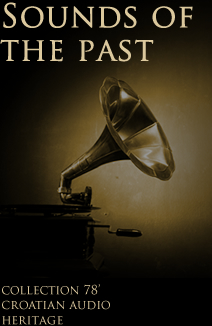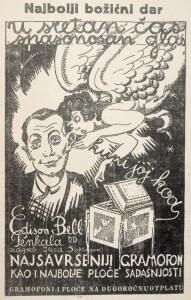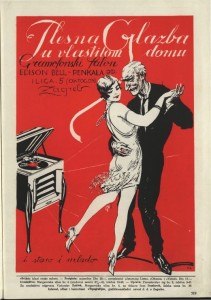Sound recording in Croatia
The development of sound recording along with the growth of the phonograph recordings market eventually reached Croatia. The Zagreb audience became familiar with the phonograph as the latest technological achievement in sound recording as early as the end of the 19th century. Nevertheless, the history of Croatian discography starts at the beginning of the 20th century. The first gramophone records that captured performances by Croatian artists and composers appeared in 1906 in the then Austria-Hungary. At that time one could easily get gramophone records and gramophone record players in Zagreb as it may be seen from plenty of data in older periodicals that were coming out at the beginning of the 20th century, such as the newspapers Jutarnji list, Obzor and Motor. As early as 1899 a certain salesman Mavro Drucker in 39 Ilica Street offered for sale ‘all kinds of mechanical musical devices’ (Obzor, 15 November 1899), while the next year, in 1900, the same newspaper mentioned phonograph for the first time and invited the public to attend the presentation of the Edison phonograph in Zagreb (Obzor, 14 March 1890).
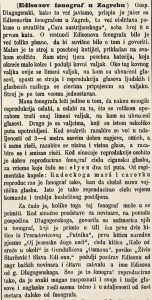
Edison phonograph in Zagreb, Obzor, 14 March 1890
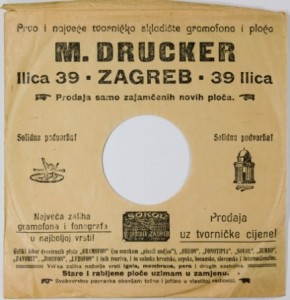
A jacket of a gramophone record with an advertisement for the sale of gramophone record players and gramophone records by M. Drucker from Zagreb
Older periodicals from the beginning of the 20th century indicate that Columbia gramophones and ‘phonograph cylinders’, such as those sold by salesman Ferdinand Budicki in 24 Marovska Street, could be bought in Zagreb as early as 1900 (Obzor, 12 December 1900). In the first decade of the 20th century the market and sales of gramophone records and gramophones grew and apart from the two abovementioned salesmen, other Croatian salesmen (Obuljen, Brusicki, Kudelka) as well as various representatives of foreign companies (Löwin, Fischer, Tomay, Kauders) entered the industry.
The majority of gramophone records were recorded abroad (Vienna, Berlin, London, Prague) until 1924 when the owner of the Edison Bell company from London set up the company’s branch in Zagreb. First it was publishing licensed records, while in 1926, when it merged with the Zagreb pen-and-pencil factory Penkala into the stock company Edison Bell Penkala (EBP), it not only started recording and publishing its own records, but also manufacturing both records and gramophones. Some of the music editors at EBP were Pavao Markovac and Ivo Tijardović. The repertoire of published records included operas, operettas, pop, folk, comic and satirical songs, as well as military music, performed by renowned musicians and actors of that time (Dejan Dubajić, Arnošt Grund, Vlaho Paljetak, Marta Pospišil Grif, Milan Šepec, Mario Šimenc and Tinka Wesel Polla).
The newspapers of the second half of the 1920s included frequent advertisements for gramophone records and gramophones.
The acoustic period of sound recording ended in 1926 when it was succeeded by the electrical era. One of the earliest gramophone records produced electrically captured a live performance of Christmas songs in the Zagreb Cathedral in December 1927. The interesting thing is that prior to this the Edison Bell Penkala company issued a public invitation to all citizens of Zagreb to join this live performance of Christmas songs, lend to it their voices and thus make their own contribution to this truly special live recording (Vaš glas u gramofonu!, Jutarnji list, 4 December 1927). Moreover, it was one of the first public recordings in the world.
The Edison Bell Penkala company operated until 1937, when it went bankrupt. After the war, in 1946, it closed down completely.
Apart from EBP, Croatian artists also recorded for Elektroton, a branch of the German Odeon-Parlophon company opened in 1937 in Ljubljana, Slovenia. In 1938 its branch was opened in Zagreb and it produced records based solely on licensed matrices. Elektroton went out of business in 1947 when the record factory Jugoton was opened taking over the assets previously belonging to EBP and Elektroton.
